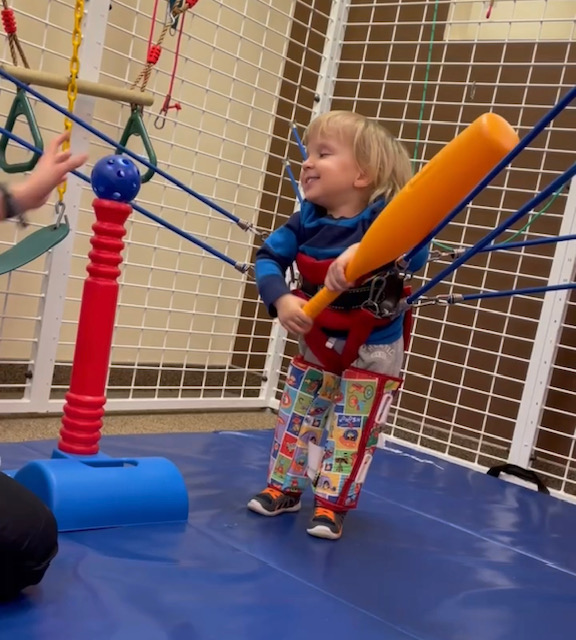

- Call 908 543 4390
- Email
- Dr.Joni Redlich PT,DPT


As discussed in The Sense of Balance there is an important sense that may not be part of our daily consciousness, but is integral to everything we do. The vestibular system plays a role in posture, balance and vision. Read more
We all learn about our 5 senses as children: smell, touch, see, hear and taste. Our sensory systems are so important to how we experience each day. We smell the delicious food that is cooking, hear the sizzle from the pan and can’t wait to get a taste. Our sensory systems also underlie our attention, focus and motor control. An important sense that may not be part of our daily consciousness, but is integral to our ability to move, play and learn, is our sense of balance.
Read more
In physical therapy we’re mostly focused on improving movement skills or maximizing ability. However, there are other essential factors that need to be present in both children and adults for physical therapy or any other form of healing to lead to wellness.
The most powerful lesson that I learned during my almost two years feeling dizzy was to take control of the things that I could control. When we face illness or disability there are many different ways to approach it, as there are different ways to approach life. Read more
I wanted to share some pictures of our trip to the new accessible playground in Ann Vann Middlesworth Park in Hillsborough. The playground provides a great sensory and movement experience to all children regardless of ability. The entrance to the playground structure is a ramp. No stairs in sight. Read more
“My son can’t keep up with his twin.”
“My daughter is always tripping and gets frustrated.”
“We finally got answers as to why my child is delayed, but now what?”
Do these concerns sound familiar to you? Have you been worried about your child and wondering where you might find answers and help? If so, you’ve come to the right place! Let’s start by answering the question-
What is a Pediatric Physical Therapist and Who Do They Help?
Pediatric Physical therapists (PTs) are licensed health professionals who have specialized knowledge and experience in the unique aspects of working with children and their families to improve motor development, independence, fitness and active participation in the family and in the community. Pediatric PTs work with children from birth through adolescence and participate on teams with other specialists, including physicians, occupational therapists and speech therapists.
They work with children to improve their brain-body connection, balance, strength, body awareness, coordination, and movement skills from crawling and walking to jumping and hopping. Pediatric physical therapists work with children to improve their sensory awareness and motor abilities. Improvement these skills can have a far ranging impact on the child beyond the movement itself, such as improving confidence, success in school, and social interaction.

Pediatric physical therapy often looks like play, but that is part of the magic! Pediatric physical therapists know how to engage the child with fun, share the joy of movement and combine that with the science of the brain and body. All these pieces come together to stimulate to new skills that the child can use in daily life at home, at school and in the community. New skills means new confidence and new success!
Read moreAs published on ourjourneythruautism.com
Exercise or therapy balls have been used in the therapy world for many years as a tool for core strengthening, developmental exercises, and for sensory stimulation. More recently they have popped up in gyms and people’s homes as an inexpensive, fun and dynamic piece of exercise equipment. Read more
As printed on ourjourneythruautism.com
Summer is the perfect time to take advantage of all the therapeutic benefits of swimming and playing in the pool. Many children who have difficulty controlling their bodies for sports and gross motor activities will have success moving in thewater. Its also such a calming and organizing sensory environment that it can provide a grounding experience for the child that can often last for the rest of the day.. Read more
The past several months I spent every extra moment I had studying. I took an exam on Saturday to obtain the credential Pediatric Certified Specialist. During every patient cancellation, after my daughter went to bed, and another other time I could grab was put towards learning everything I could about the field that I have devoted myself to professionally over the past 11 years. Along the way I learned a lot of new things, sometimes a small detail, sometimes familiarizing myself with a diagnosis I have not see in person (you tube was an awesome resource since I’m a visual learner), and other times a reflection on my personal life and professional practice. I thought I would share some of these things today. Read more
Reposted from Our Journey Thru Autism
Children with autism spectrum disorders often have movement as a strength. Perhaps the child cannot talk or doesn’t know how to initiate play with a peer, but they can typically walk down the block and climb the monkey bars. We’re not talking about the quality, variety, or skill level of movement because children with ASD often have significant deficits in these aspects of movement. We are so often focusing on what children with developmental disabilities can’t do and coming up with strategies to improve these areas. What if we flip it and and look at their strengths. If we have identified movement as a strength, then how can we USE that strength to help a child learn, have fun and engage in social interactions. Read more
